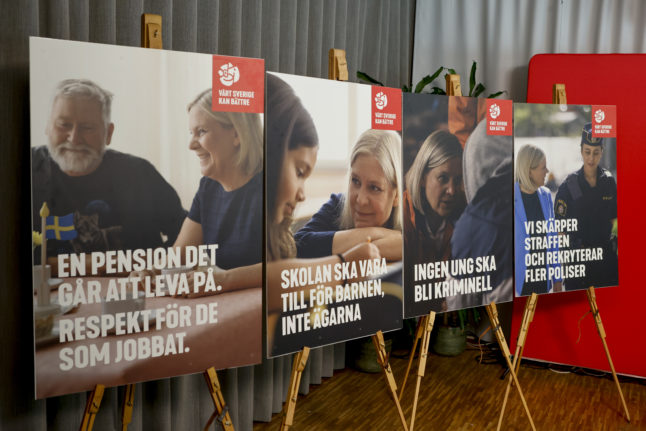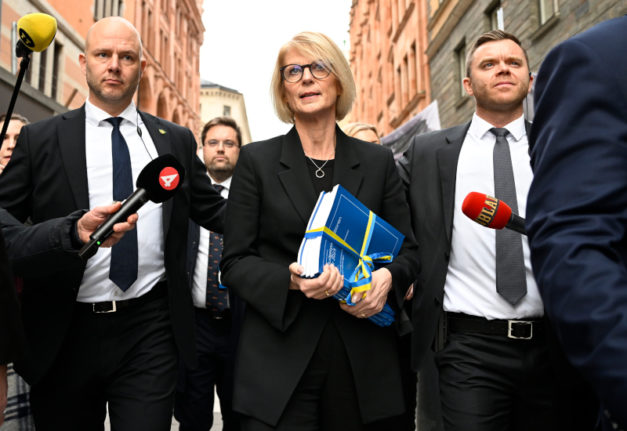In a press conference held by party secretary Tobias Baudin, the ruling Social Democrats revealed their campaign posters for the upcoming election on September 11th.
Climate issues
The absence of campaign posters addressing the issue of climate change and the environment was conspicuous, with Baudin explaining when questioned that it is still a priority for the Social Democrats, as the climate transition (klimatomställning) is a “huge opportunity” to create more jobs.
“It’s an opportunity to create more jobs in our country,” he said. “I’m from Norrbotten myself and there’s a lack of jobs there. That’s why it’s so obvious that everyone who can work, should work, and here we see the climate transition as a huge opportunity.”
Furthermore, he said, the climate issue will be “more prominent on social media”, where younger voters are more likely to see it.
Win the election
Baudin also explained the Social Democrats’ goal for the upcoming election.
“Formally, our goal is to get a better result than last time, where we got 28.3%,” he said. “We’ve got good hopes of breaking that with a good margin. Our focus, and my focus, obviously, is to get as many votes as possible.”
“The more votes we get, the better chance we have of carrying out the policies we are going into the election with.”
He did, however, indicate that the party could be open to forming a coalition government following September’s election.
“Our goal is to form a Social Democrat government or a Social Democrat-led government after the election,” he said.
“We can work with all parties apart from the Sweden Democrats, but obviously those who are closest to us are the Greens, the Left Party and the Centre Party”.
Moderates ‘still have a lot of questions to answer’
The opposition right-wing Moderates recently announced their own election campaign focusing on issues where the opposition parties are united in their disagreement with the Social Democrats.
Baudin was disparaging of that campaign, accusing them of dodging the larger issues.
“I noted that they agreed on eleven points,” he said. “One, for example, was that you should be able to make a living by working.”
“I think a lot of people probably agree on that,” he smirked.
“But the big questions – should we have state-run healthcare? State-run schools? The raised threshold in A-kassa? Should that stay? What about foreign policy? What does being dependent on the Sweden Democrats mean for our role in the EU? Connections to Russia? What kind of equality policy will there be? The Liberals’ or the Sweden Democrats’?”
“They still have a lot of questions to answer.”
A presidential-style campaign?
The Social Democrats also revealed four posters focusing on Magdalena Andersson and other prominent party figures, such as Finance Minister Mikael Damberg, Health Minister Lena Hallengren, and Baudin himself.
When asked whether this focus on Andersson and her leadership was a sign that the Social Democrats were aiming for a presidential-style election comparing Andersson to the Moderates’ leader Ulf Kristersson, Baudin did not give a clear answer, choosing instead to focus on Andersson’s leadership.
“We have a party leader who has a high level of voter confidence, she has also handled many crises since November last year […] she’s a very competent party leader and prime minister. And she’s good for Sweden, lots of people also are clear on that.”
“My task, our task is to be clear that if you want her as Prime Minister, you can’t vote for the Moderates or the Sweden Democrats. If you want her as Prime Minister, if you want her to lead our country, you have to vote for us.”



 Please whitelist us to continue reading.
Please whitelist us to continue reading.
Member comments